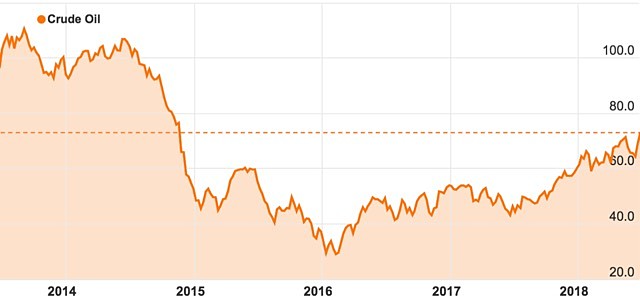Oil prices spike to their highest level in over 3 years

Crude oil price spiked above US$74 per barrel this week.
Oil prices are back in the headlines and reaching for record highs, with the usual geopolitical suspects taking the blame as the cause.
The crude oil price spiked above US$74 per barrel this week, for the first time since December 2014, extending its uptrend that started back in August last year.
Crude prices are up 62% since June last year and 22% higher year-to-date.
Oil prices have been consistently rising over the past 6 months on the back of several geopolitical factors that have simultaneously combined to extend demand and raise fears of dwindling supplies.

Crude oil price chart in USD.
As of late, production collapsed in crisis-riddled Venezuela and sentiment was hit further on the back of Donald Trump’s withdrawal of the United States from the Iran nuclear deal.
Over the past 2 days, the US demanded all countries halt imports of Iranian oil from November, as Donald Trump’s hard-line position towards Iran intensifies and hopes to cut off international funding to the beleaguered Middle-Eastern state.
Elsewhere on the geopolitical stage, Saudi Arabia has vowed it will pump more crude oil into markets that continue to recover but remain fearful of inventories running low.
“Saudi Arabia is opening the floodgates,” said Bob McNally, a former White House official who is now president of consulting firm Rapidan Energy Group. “That means there is no spare capacity in the oil market at a time when geopolitical tensions are high.”
OPEC and Russia reached an agreement last week regarding the supply of more oil, but the promise of additional supplies disappointed oil traders who had expected for a larger announcement.
As the production leader of OPEC, Saudi Arabia announced that it plans to pump a record-high 11 million barrels of oil per day in July, the highest rate in its history, up from about 10.8 million bpd in June.
Oil prices spiked after OPEC’s agreement was released and were further boosted by persisting worries surrounding US sanctions and the potential that trade relations will continue to worsen between the major developed nations.
Oil has become the largest single component of international trade and the world’s primary source of commercial energy – although alternatives are slowly coming to the fore to alleviate the pressure on oil supplies.
However, before alternatives such as natural gas, nuclear, lithium, hydrogen or renewables have had a chance to provide a sizable contribution to the energy mix, oil maintains a strong potential to cause geopolitical conflict and even all-out war. Therefore, oil has become one of the primary caveats that determine the modern military-political-economic balance around the world.
The wrangling between the US, China and Europe has not spilt into oil markets as yet but is weighing on economic sentiment and helping oil prices to rise as speculators add weight to the existing uptrend. Which in turn is likely to see oil stocks continue to benefit.
Ethiopia joins the production party
One intriguing development relating to crude oil markets was the debut of Ethiopia as the world’s newest oil producer.
Ravaged by domestic instability including civil war for decades, the African nation began to pump crude oil this week under a test production scheme that will see an initial production of 450 barrels of oil per day from the Ogaden Region in the southeast of Ethiopia.
The trickle is expected to become a torrent over the coming years as Ethiopian authorities aim to ramp up production to reinforce dwindling domestic budgets.
On Wednesday, Fitsum Arega, Chief of Staff of Ethiopia’s Prime Minister Office, said that Ethiopian Prime Minister Abiy Ahmed met with representatives from Poly-GCL Petroleum Investment, the first company to tap Ethiopian oil and to officially kick-start the country’s crude oil production.
The company has discovered that there is a prospect of commercial quantities of crude oil in the region with future supplies likely to be expanded gradually over time.
Later this year in September, Ethiopia also plans to start the construction of a pipeline that would export natural gas via Djibouti, Ethiopia’s neighbour to the northeast that lies on the Bab-el-Mandeb Strait.
